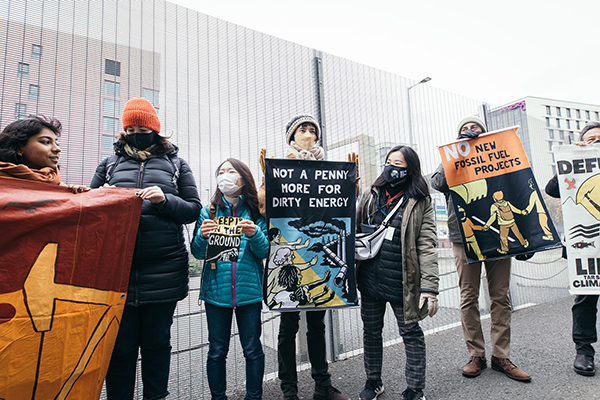
Photo/ @8iank4 on IG
As this is being written, President Biden has signed the $1.2 trillion Infrastructure Investment and Jobs Act (IIJA) into law. Now progressive lawmakers and advocacy groups are pushing Congress to pass the Build Back Better Act, which boosts spending for social programs and for the climate emergency. (The original agreement between progressives and the corporate Democrats was that both bills would be passed together, but the corporate Democrats violated this agreement and pushed the IIJA through by itself.)
Though the IIJA is presented as a $1.2 trillion bill, it actually only increases infrastructure spending by $550 billion over 10 years above what was already in the federal budget. According to the Wall Street Journal, the new law includes $110 billion in funding for roads, bridges and major projects; $39 billion to modernize and make public transit more accessible to the disabled and elderly; a $66 billion investment in rail maintenance, modernization and expansion, most of which will go to Amtrak; $11 billion for highway and pedestrian safety programs; $7.5 billion for implementing a network of electric-vehicle chargers; $7.5 billion for zero-emission or low-emission buses and ferries; $42 billion in new spending for ports and airports; $50 billion to beef up the country’s infrastructure generally against climate change and cyberattacks; $55 billion for clean drinking water; $65 billion for broadband infrastructure and development; $21 billion for removing pollution from soil and groundwater, job creation in energy communities and a focus on economic and environmental justice; and $73 billion to update and expand the power grid.
The second bill, the Build Back Better Act (BBBA), started out as a $6 trillion measure, got cut down to $3.5 trillion, and at this writing has been slashed to $1.8 trillion by the corporate Democrats and Republicans.
Jake Johnson, writing in Common Dreams Nov. 16, said: “Over the past several months, the Build Back Better package has been dramatically weakened to appease corporate-backed Democrats whose votes are needed to get the bill through the narrowly divided House and Senate. After removing priorities such as dental and vision benefits for Medicare and slashing funding for the remaining programs—including universal pre-K—Democrats currently have a bill that includes roughly $1.8 trillion in spending over 10 years, about half of what was proposed in the original framework. Now even the pared-back version is under threat from a handful of conservatives in the House and Senate…”
The Poor People’s Campaign, in a statement on its website, noted that the BBBA as it currently stands includes positive provisions that would:
- Maintain the expanded Child Tax Credit to benefit 35 million households for another year.
- Maintain the expanded Earned Income Tax Credit to benefit 17 million low-wage workers without children.
- Establish universal pre-k for 3- and 4-year olds, which will benefit 6 million children and their families. Alongside money for affordable child care, families with children will have greater support for their children in school.
- Close the Medicaid coverage gap and provide health coverage to 4 million uninsured people, including 1.3 million people of color, until 2025.
- Raise wages for home health care workers, 28% of whom are Black, 23% of whom are Latino and most of whom are women.
- Provide 18 million low-wage and essential workers with 4 weeks of paid family and medical leave.
“These and other provisions are being funded through taxes on corporations and the wealthy, meaning that all of this will not add anything to the deficit,” said the Poor Peoples Campaign. “All of these provisions are only in there because we and others have been fighting for them for a very long time.”
However, the campaign added that, “There are also limitations to the BBB Act that we must take into account:”
- The climate investments in the infrastructure package and BBB Act are just 11% of what we actually need to really push back against the climate crisis.
- Although the BBB Act will put resources towards 1 million affordable housing units, the looming eviction crisis is compounded by a housing and rental debt crisis that is far greater than what is funded. Without an eviction moratorium or debt relief, tens of millions of people are at risk of becoming homeless in the coming months.
- Very little to nothing is going towards improving the infrastructure of our public schools, where our children spend most of their time.
- Most of the bill’s provisions may not reach immigrant families and undocumented families, potentially leaving out at least 11 million people, including millions of children. Vice President Harris can overrule the Senate Parliamentarian and make sure that 11 million undocumented people have permanent protections from deportation.
- The protections for the Apache sacred lands of Oak Flats have been removed. This means that these lands are at risk of complete devastation by a mining company seeking copper for weapons of war, which will pollute and desecrate our planet even more.
- Agricultural investments towards marginalized farmers, regenerative agriculture and farmland conservation, among other necessary actions to repair our lands, are funded at just 2% of what is necessary. This will have a profound impact on the livelihood of small farmers, especially black and minority farmers.
- The “revenue raisers” or taxes on corporations and the wealthy don’t go far enough, especially given that their wealth has increased by over $2 trillion since March 2020, more than the cost of the BBB Act. Not only is it possible to tax the wealth that they gained and fund a larger Build Back Better Agenda, doing so will benefit the economy.
“This is why we will keep pushing for the programs and policies we need, while also fighting for the full BBB Act,” said the campaign. “We need this infusion of resources into our communities now and we know this agenda will benefit our economy.”

